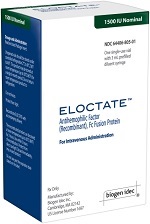 |
| Courtesy of Biogen |
Biogen ($BIIB) may have been first to market with its next-gen, long-acting hemophilia treatments. But with competition coming up the pipeline--and patient-switching not happening at the rate Biogen had hoped--the company is touting new data to help build up its position.
92% of adult and 58% of pediatric patients in a Phase III extension trial of hemophilia A med Eloctate recorded at least 100 exposure days on therapy without developing inhibitors--antibodies that the immune system develops to combat clotting factors, Biogen announced Monday.
On top of that, the participants on a preventive regimen of three to 5 days--who had already completed other Phase III studies with the drug--experienced low bleeding rates during the trial, and 22% of them were able to extend the time between infusions, the company said.
"The results suggest prophylaxis with Eloctate shows efficacy and safety for the long-term treatment of hemophilia A," Guy Young, Director of the Hemostasis and Thrombosis Center at Children's Hospital of Los Angeles, said in a statement.
And that's just what Biogen was hoping for as it prepares to square off against new hemophilia rivals from Bayer, Novo Nordisk ($NVO) and Baxter ($BAX) spinoff Baxalta ($BXLT).
Biogen had been hoping to steal market share from Baxalta's old-guard meds from when it priced Eloctate and fellow new treatment Alprolix--for hemophilia B--on par. But that process didn't get off to a strong start. Then-Baxter's hemophilia sales grew 7% in the quarter covering the first three months of Eloctate's launch, with physicians telling Leerink Partners analyst Danielle Antalffy that "brand loyalty and market stickiness" would keep some patients on Baxter's Advate.
The fact that Baxalta has its own new-age meds on the way to market "resonates" with some patients, too, Antalffy wrote--and recently, the Illinois pharma rolled out promising data of its own that may help patients justify the wait.
Its hemophilia A prospect, to be known as Adynovate when it hits the scene, topped Advate at clotting and preventing serious bleeds, the company said in late July. In a Phase II/III study, Adynovate nailed its primary endpoint in cutting down patients' annualized bleed rate, and it also effectively controlled all bleeding episodes--doing so with just one or two infusions in 95.9% of cases.
- read Biogen's release